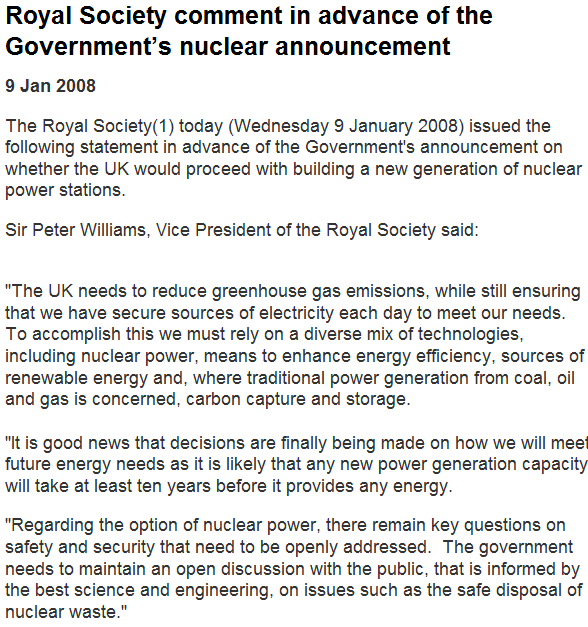|
|
|
|
|
|
|
News & Views item - January 2008 |
![]() UK's Labour Party Backs New Nuclear Plants, Royal Society Gives Cautious Backing,
Opponents Claim Hidden Subsidies. (January 11, 2008)
UK's Labour Party Backs New Nuclear Plants, Royal Society Gives Cautious Backing,
Opponents Claim Hidden Subsidies. (January 11, 2008)
Gordon Brown's Labour Government has approved the building of new nuclear fuelled power plants for the United Kingdom. It has given public assurances that private companies intending to build new plants would be responsible for the entire cost in addition to "meeting the full costs of decommissioning and their full share of waste management costs"
Prior to the announcement the Royal Society issued the following statement:

Alan Duncan, Tory shadow business secretary, said: "Our position is, by and large, similar to the government's. If business wants to invest on that basis, it should be free to do so, and it should know that the investment climate will remain stable under any Conservative government."
The matter in contention is indicated by the phrase the investment climate will remain stable.
The Liberal Democrats claim the government had not been able to give a cast iron guarantee that taxpayers will not have to subsidise the costs of nuclear in the future. "This was a great big signal to the industry that the government will see it right," said Steve Webb, environment spokesman.
French nuclear operator, EDF announced: "EDF will now step up its plans to take part in building a series of four new nuclear new plants in the UK, using European pressurised water reactor technology, with the first one completed by the end of 2017."
The Guardian reported: "The Department of Business, Enterprise and Regulatory Reform insisted no special case was being made for nuclear. It had been working on some kind of carbon scheme that would enable investment in all types of low-carbon technologies to continue if there was any hold-up in a replacement for the EU emissions trading scheme which runs out in 2012."
However, Greenpeace accused the government of providing covert subsidies to give the industry the support it needed. "Nuclear companies will be able to cap their liabilities, leaving the taxpayer exposed if estimates for dealing with waste change. The government admits that the public will pick up the liabilities," director John Sauven claimed, and in addition, "The length of time between starting a new nuclear plant and putting the waste into repository could be over 150 years. Any discount rate or estimate on what costs might be in 2170 is pie in the sky".
The Guardian also reports that the New Economics Foundation accused the government of "fixing the market". Its policy director Andrew Simms said: "Nuclear power will not survive on its own in the market place. The government will have to use voodoo economics to underwrite capacity. The only beneficiaries are the big energy companies.".
Finally, Terry Macalister and John Vidal of The Guardian point out: "The government has repeatedly said that replacing nuclear capacity would be up to the private sector to initiate, fund, construct and operate and cover the costs of decommissioning and their full share of long term waste management costs."
And more specifically, in analysing the government's document:
The specific references to some kind of financial incentives comes in
Section 32 of the document which says companies would be able to rely on the EU
emissions trading scheme to build investor confidence but it also goes further.
"We will also keep open the option of further measures to reinforce the
operation of the EU ETS in the UK should this be necessary to provide greater
certainty for investors," it says.
There are also commitments on waste and decommissioning in section, 3.52.
Operators are responsible for decommissioning and waste management costs but "if
the protections we are putting in place prove insufficient, in extreme
circumstances the government may be called upon to meet the costs of ensuring
the protection of the public and environment."
A maximum figure is also being put on waste costs to cap long term liabilities
to private companies . Section 3.75 says: In response to the consultation,
energy companies have indicated that they could be prepared to pay a significant
risk premium over and above the expected costs of disposing of waste, in return
for having the certainty of a fixed price."